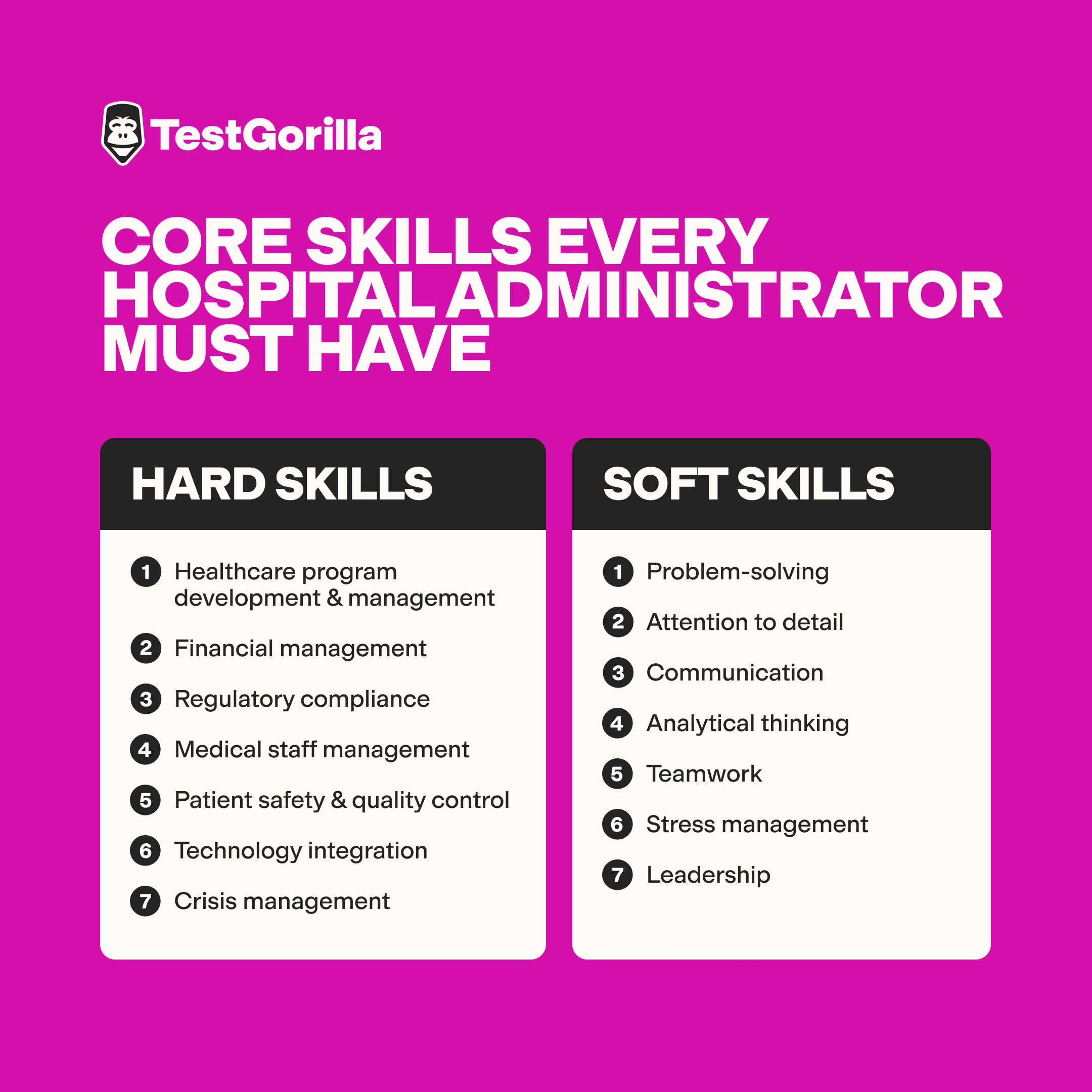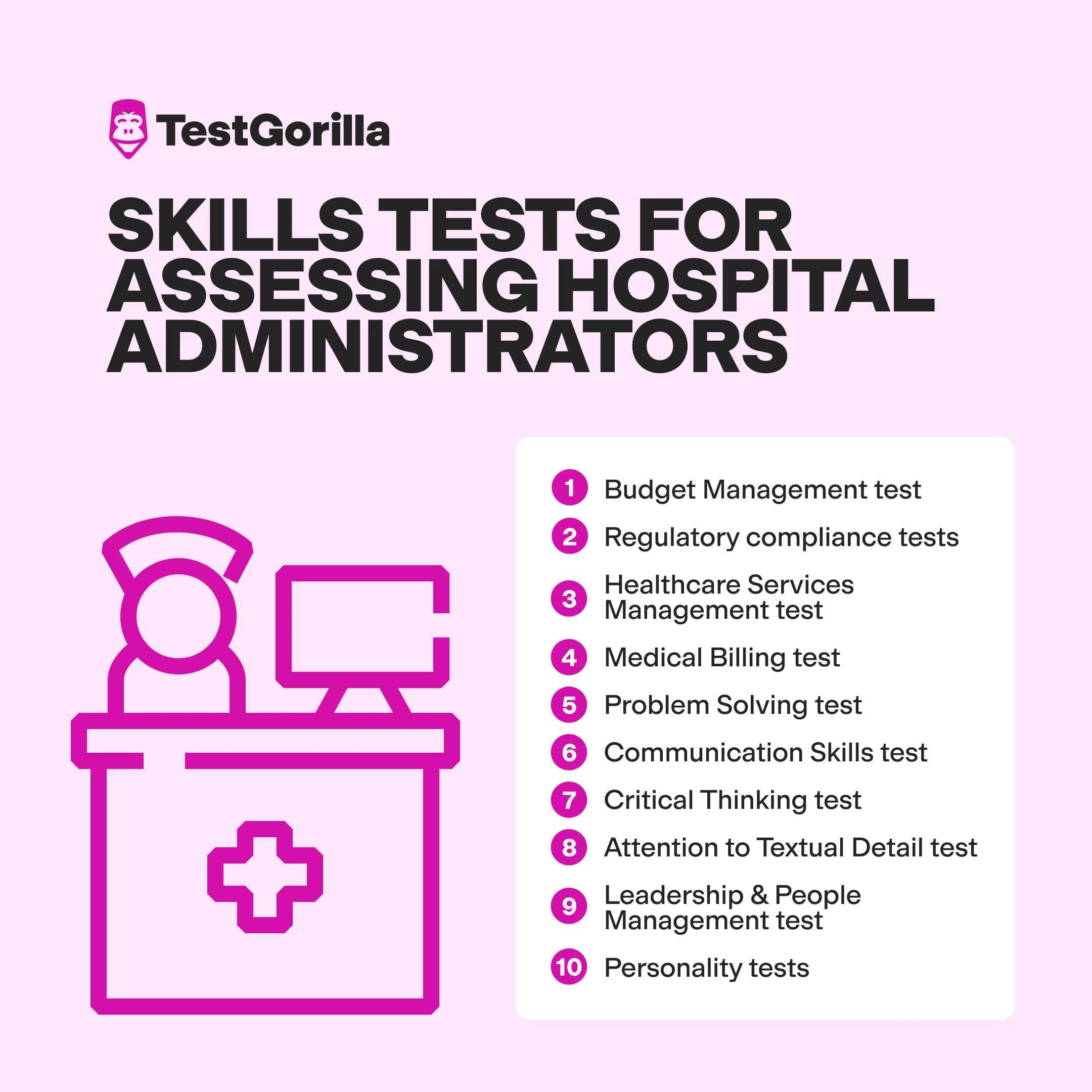Hiccups and inefficiencies in a hospital’s operations can quickly escalate into life-or-death situations. That's why having the right hospital administrator is so important. This key player makes sure everything runs smoothly and that your staff is well-equipped to provide world-class healthcare. Achieving this requires an individual with a unique mix of skills.
Not sure what those skills are? Picking the wrong candidate for this role could lead to serious operational bottlenecks and put patient care at risk.
But don’t worry – our guide is here to help. We walk you through the essential skills needed for a top-notch hospital administrator. Plus, we show you how to use talent assessments to spot the leaders who will keep your healthcare facility safe and efficient.
Table of contents
What is a hospital administrator?
A hospital administrator is a key leader in healthcare. They make sure the hospital operates effectively, upholds medical standards, and uses resources efficiently to enhance patient care. They create a supportive and efficient environment for patients, staff, and the broader community.
Each day, hospital administrators monitor operations, update patient care protocols, and manage hospital resources. They might review clinical practices, train staff as necessary, and promptly address any emerging issues.
They collaborate with medical staff, department heads, and regulatory agencies to improve the healthcare environment. They update procedures, make the hospital safe and welcoming, and sometimes even suggest new healthcare strategies.
In addition to managing daily activities, they make sure the hospital complies with all health regulations and standards.
Hospital administrators are vital in any healthcare setting – from local clinics to major hospitals.
Core skills every hospital administrator must have
A hospital administrator needs a mix of healthcare management and interpersonal skills to effectively run your hospital and ensure high-quality patient care. Here's a rundown of the essential hard and soft skills needed for anyone looking to thrive in this role.
Hard skills
These hard skills help your hospital administrator manage and transform healthcare services at your hospital:
Healthcare program development and management for understanding how to create and adjust hospital programs to meet your healthcare goals and patient needs
Financial management for managing budgets effectively – including handling billing, dealing with insurance, and allocating funds across hospital services
Regulatory compliance so your hospital complies with HIPAA and other important health standards
Medical staff management for overseeing the recruitment, training, and coordination of medical staff to ensure top-notch patient care
Patient safety and quality control for implementing safety protocols and quality improvement initiatives to enhance patient outcomes and minimize risks
Technology integration for managing the use of medical technology – from electronic health records to sophisticated diagnostic tools – to improve patient care
Crisis management for preparing and responding effectively to emergencies, such as public health crises or facility issues
Soft skills
Your hospital administrator should also possess the following soft skills:
Problem-solving for addressing and solving healthcare and administrative challenges as they arise with innovative and effective solutions
Attention to detail so they can monitor healthcare processes and compliance to ensure everything runs smoothly
Communication for clearly conveying hospital policies and decisions to medical staff, patients, and the community
Analytical thinking for evaluating clinical data and operational metrics to make informed decisions that improve hospital performance
Teamwork for collaborating with your medical staff and administrative personnel to create a united healthcare environment
Stress management for maintaining composure and decision-making capacity under pressure, especially during critical situations
Leadership for guiding and motivating teams to achieve world-class healthcare results and maintain smooth operations, even in tough times
Curious about other leaders in healthcare? Our article on hiring medical directors might interest you.
How to assess hospital administrator candidates
When you’re looking for a hospital administrator, don’t just look for someone who knows their way around healthcare management. Try to spot someone who’s got the people skills to match.
This is where TestGorilla comes into play. Our talent discovery platform can help you find candidates who’ve got the full package – medical expertise, great interpersonal skills, and more.
Our platform lets you mix and match up to five different tests to tailor your assessment just right. You can even throw in some of your own questions to really target what you’re looking for. It’s a straightforward way to make sure you’re picking a candidate who can handle both the day-to-day and the unexpected with finesse.
Here’s how you might approach this assessment for hospital administrators.
Make sure they have the hard skills first
To evaluate the hard skills of hospital administrator candidates, you might use these tests:
Budget Management test: This test checks candidates’ understanding of financial policies, their ability to create and analyze budgets, and more. Use this test to see how they’d manage the financial side of hospital operations.
Regulatory compliance tests: Tests like HIPAA test help you make sure candidates know their stuff when it comes to the legal bits that keep healthcare settings in line.
Healthcare Services Management test: This test checks if a candidate has what it takes to lead a team in a healthcare setting.
Medical Billing test: Hospital administrators should know the basics of medical billing since they oversee a hospital’s financial operations. This test assesses their understanding of billing and reimbursement, insurance and claim management, and more.
Then, follow up with their soft skills
To assess your candidates’ soft skills, you might use these tests:
Problem Solving test: This one's all about seeing how sharp a candidate is at spotting issues and figuring out smart ways to solve them. This test also sees how well candidates can create and adjust schedules, so it's great for admins who’ll be in charge of scheduling hospital staff.
Communication Skills test: This test gives you the lowdown on how well candidates can break down complex information into clear, easy-to-understand messages for different people.
Critical Thinking test: This test checks out how candidates think through situations and make decisions.
Attention to Detail (Textual) test: This test helps you see how well they process information and whether they can pay close attention to details in text.
Leadership & People Management test: This one helps you see how well they support their team, hand out tasks, and give feedback.
Personality tests (Big 5, 16 Types, Enneagram): These tell you more about their motivations, work preferences, and communication styles – helping you understand how they might fit into your team.
Don’t forget to check how they’d affect your hospital culture
Hospital administrators oversee various departments – medical, nursing, finance, and HR – making sure everything clicks to create a top-notch environment for patients. It’s super important that they really gel with and add something special to your hospital's culture.
Check out our Culture Add test. It gives you a sneak peek into candidates’ values and behaviors, helping you find someone who’s a great fit and brings something new to the hospital to elevate your healthcare game.
Finally, fill in any gaps with interview questions
If our tests don’t capture all you need to know about a candidate’s skills or qualities, digging deeper in the interview can really help.
For instance, to assess crisis management skills, you might ask:
Can you share a time when you had to manage a sudden crisis in the hospital? What was the situation, and what steps did you take?
This question lets you see how candidates react under pressure and handle urgent, high-stakes situations.
Another key question could be:
Can you describe an instance where you had to work with multiple departments to handle an emergency or significant change in hospital operations? What role did you play, and what was the outcome?
This helps you see how candidates manage complicated situations involving multiple teams – and how well they lead when it counts the most.
Psst! Read our article on 50+ interview questions for administrator roles for more question ideas.
2 mistakes to avoid when assessing hospital administrator candidates
These mistakes could result in hiring a hospital administrator who doesn’t fit your healthcare environment.
1. Forgetting about their crisis management skills – including emergency preparedness
Hospitals face all kinds of crises, from medical emergencies to public health outbreaks. When things go wrong, a hospital administrator needs to keep patient care top-notch and maintain the hospital's reputation. If you don't check their crisis management skills and emergency preparedness, things can get messy fast.
For instance, if an administrator can't handle a sudden outbreak well, patient care might suffer, and the crisis could get worse. Plus, if they're not ready for emergencies, they might not use resources properly, respond quickly enough, or have good backup plans – making a bad situation even worse.
2. Neglecting patient focus
President and CEO of Novant Health Carl Armato has said, "Everything we do starts with the patient. How can we eliminate their pain points, what do they need and how can we change to meet those needs? It's a balanced approach to quality, patient engagement, team member engagement and operational excellence."
As Armato’s quote shows, hospital administrators need to focus first and foremost on patients – on making them comfortable and satisfied. This means offering services that patients like and being kind and understanding.
If you don't check how much a candidate cares about the patient experience, you could wind up with a hospital administrator who makes patients go elsewhere and gives the hospital a bad name.
FAQs
Who is the top administrator at a hospital?
The top administrator at a hospital is often the chief executive officer (CEO). They oversee the overall operations of the hospital and are responsible for making strategic decisions to ensure the hospital runs efficiently and provides high-quality patient care.
Which course is best for hospital administration?
Several courses can prepare individuals for a career in hospital administration, including:
1. Master of Health Administration (MHA)
2. Master of Business Administration (MBA) with a focus on healthcare management
3. Bachelor of Science in Healthcare Administration
4. Bachelor of Science in Business Administration with a concentration in healthcare management
Make hiring hospital admins easy with TestGorilla
Finding the right hospital administrator is key to keeping your healthcare facility running smoothly. They need a mix of skills – from managing healthcare operations to handling crises.
If you hire someone without these skills, you could end up with operational hiccups, lower patient care quality, and a stressed-out team.
TestGorilla offers a range of tests to help you check for these essential skills, making it easier to choose the perfect leader for your hospital.
Ready to improve your hiring process? Check out the 400+ tests in our test library, book a demo, or sign up for a free account to get started today.
Related posts
Hire the best candidates with TestGorilla
Create pre-employment assessments in minutes to screen candidates, save time, and hire the best talent.
Latest posts
The best advice in pre-employment testing, in your inbox.
No spam. Unsubscribe at any time.

Hire the best. No bias. No stress.
Our screening tests identify the best candidates and make your hiring decisions faster, easier, and bias-free.
Free resources
This checklist covers key features you should look for when choosing a skills testing platform
This resource will help you develop an onboarding checklist for new hires.
How to assess your candidates' attention to detail.
Learn how to get human resources certified through HRCI or SHRM.
Learn how you can improve the level of talent at your company.
Learn how CapitalT reduced hiring bias with online skills assessments.
Learn how to make the resume process more efficient and more effective.
Improve your hiring strategy with these 7 critical recruitment metrics.
Learn how Sukhi decreased time spent reviewing resumes by 83%!
Hire more efficiently with these hacks that 99% of recruiters aren't using.
Make a business case for diversity and inclusion initiatives with this data.





















